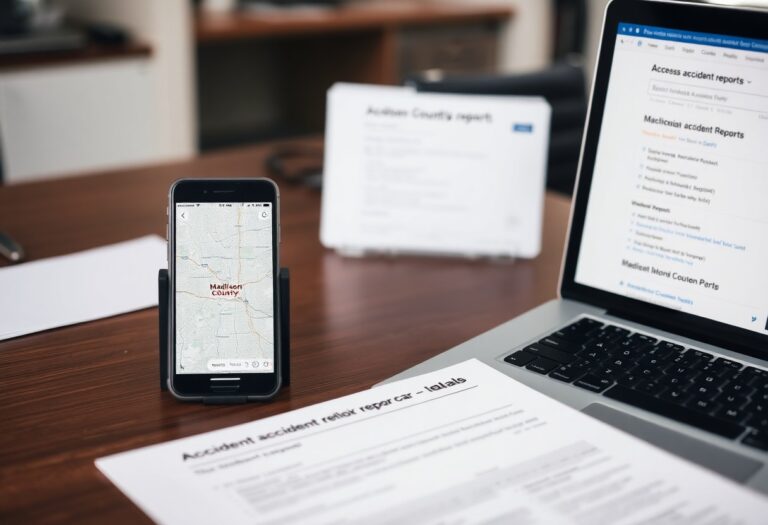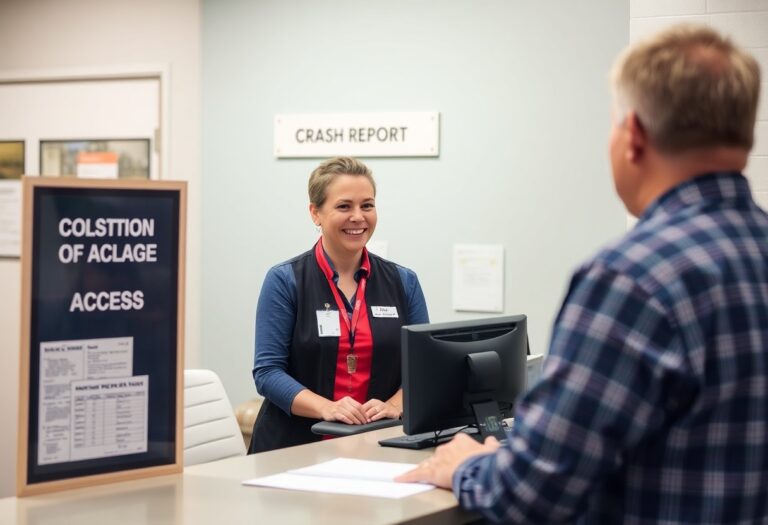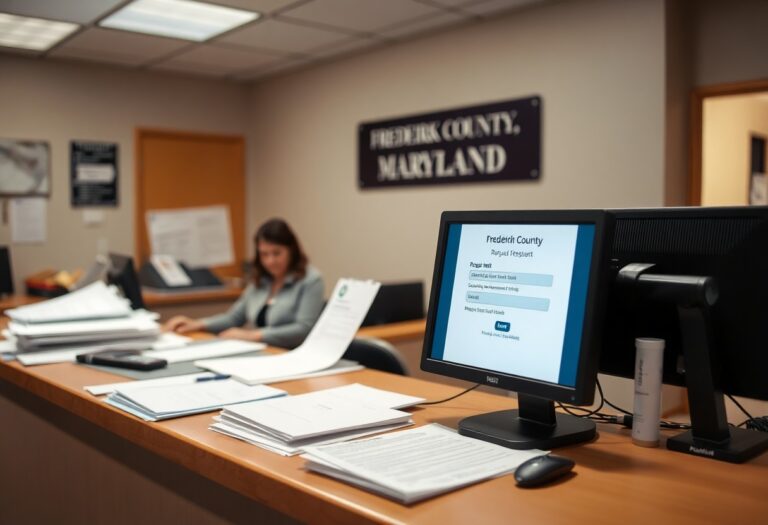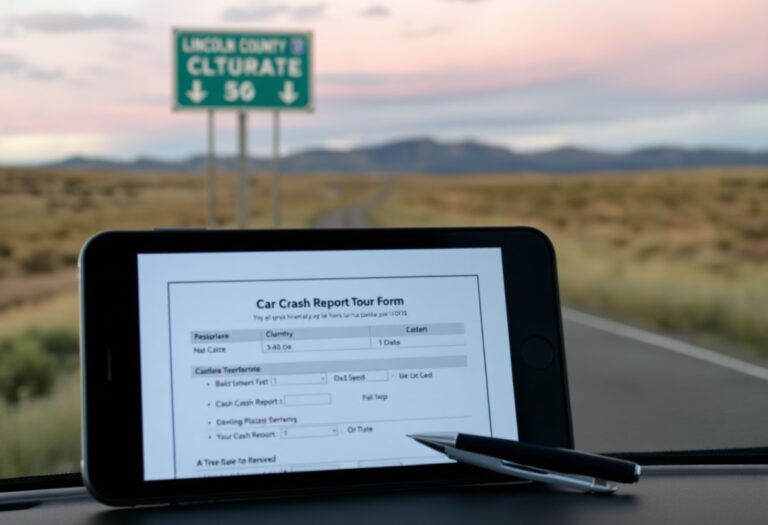There’s a lot to consider after a car accident, and securing the right report is crucial for your peace of mind and legal protection. In this post, you’ll find step-by-step guidance on how to navigate the process of obtaining your accident report in Providence County, Rhode Island. Understanding how to properly document and file your report can greatly impact your situation, whether you’re dealing with insurance claims or potential legal action. Let’s walk you through the necessary steps to ensure you’re well-informed and prepared.
The Crucial First Steps After a Car Accident
After a car accident, your immediate focus should be on safety and recording important details. Ensure everyone involved is safe and, if necessary, call for medical assistance. Once you’ve ensured safety, pull your vehicle to a secure location if possible. Next, contact law enforcement to report the accident, and wait for officers to arrive. They will document the scene and create an official accident report that is crucial for your records and any potential insurance claims.
Documenting the Scene: What to Capture
Capturing details at the accident scene plays a vital role in your case. Take clear photographs of vehicle damage from multiple angles, including any relevant road signs, signals, or contributing factors like debris or skid marks. Capture environmental conditions such as visibility and weather, as these may affect liability. Additionally, make notes about the time and location of the accident to help establish the context.
Gathering Witness Information: Who to Talk To
Identifying and talking to witnesses can provide pivotal insights into the accident. Approach bystanders who observed the incident and ask for their contact information, including names, phone numbers, and email addresses. Eyewitness statements can strengthen your account of the events and offer support for your claims during any legal or insurance proceedings.
Engaging witnesses early can help prevent important details from fading with time. Consider checking local businesses or residences near the scene, as employees or residents may have seen the accident or heard the impact. Reach out to them politely, explaining your situation and asking if they would be willing to share what they saw. Their accounts could be invaluable, particularly to clarify disputes about who was at fault, making their contact information a key component of your accident documentation.
Filing a Police Report: Your Responsibilities and Rights
After a car accident, submitting a police report is part of your responsibility. This report documents the incident and aids in insurance claims or potential legal proceedings. You have the right to receive a copy of the report once it’s filed, which can help you understand the official narrative of the accident and support your claims effectively.
Understanding the Legal Requirement in Providence County
In Providence County, the law mandates that any car accident resulting in injury, death, or property damage exceeding $1,000 must be reported to law enforcement. You are obligated to report such incidents within a specific time frame, typically within 24 hours. Not filing a report can result in legal repercussions, emphasizing the necessity of adhering to this requirement.
How to Request a Copy of the Police Report
Once a police report has been filed, you can request a copy through the appropriate local law enforcement agency. This can often be done online, over the phone, or in person, depending on the department’s policies. Fees may apply, so be prepared with the necessary details like the incident date and report number.
To request your police report, begin by locating the specific department that handled your accident, whether it’s the city police or the state police. Visit their official website or contact them directly to inquire about the request process. Most agencies require you to fill out a form and might ask for your driver’s license and accident details. Fees usually range from $5 to $15 per report, and many departments offer online payment options to streamline the process.
Navigating Insurance Claims: Essential Guidelines
Your journey through insurance claims after a car accident can feel overwhelming, but understanding the process eases the load. Collecting and presenting clear documentation, including accident reports and medical records, significantly strengthens your case. Start by notifying your insurance company promptly to avoid delays in your claim. Be prepared to discuss details regarding the accident, injuries, and vehicle damage with your adjuster. Be clear and concise, sticking to the facts while maintaining a detailed record of all communications related to your claim.
Communicating with Your Insurer: Dos and Don’ts
Effective communication with your insurer can expedite your claim process. Always provide honest and accurate information about the accident and your injuries. Establish a dedicated point of contact within the insurance company for streamlined communication. Avoid admitting fault during conversations, as this can jeopardize your claim. Document all interactions, including dates and names, to ensure you have a clear record to reference if disputes arise.
Common Pitfalls in Submitting Claims
Submitting an insurance claim often comes with challenges that can delay or deny your compensation. One of the most frequent issues occurs when claimants do not thoroughly document all aspects of the accident, including witness statements and photos of damage. Failing to submit claims within the specified time frame set by your policy can result in automatic denial. Additionally, understating your injuries or damages may lead to inadequate compensation, so ensure you provide detailed medical and repair estimates right from the start.
Attention to detail can significantly impact your claim’s outcome. For example, missing deadlines can be critical; many policies require claims to be filed within a certain period, often between 30 to 60 days. Inadequate documentation can also weaken your case, so keep meticulous notes and gather relevant evidence. If your injuries develop after the initial claim submission, report these updates promptly to avoid complications later on. By steering clear of these common pitfalls, you position yourself for a smoother claims process and a fair settlement.
The Importance of Medical Documentation
Your medical documentation serves as a fundamental piece in substantiating your claim after a car accident. Accurate and comprehensive medical records not only detail the injuries you sustained but also outline the treatment you’ve received, making them vital for the claims process. In Rhode Island, having a well-documented medical history can affect the outcome of your insurance claims and any legal actions you may need to pursue.
Why You Should Seek Immediate Medical Attention
Seeking immediate medical attention following an accident is vital, even if you feel fine. Injuries such as concussions or internal damage often remain hidden until they worsen, making prompt evaluation by healthcare professionals important for both your health and any future insurance claims.
How Medical Records Impact Your Claim
Medical records are a powerful tool in establishing the link between the accident and your injuries. Insurers often rely on these documents to determine liability and compensation. Incomplete or missing records can lead to difficulties in proving your claims, potentially resulting in lower settlement offers.
Establishing a connection between the accident and your injuries through medical documentation involves more than just medical bills. Detailed notes from doctors, treatment plans, and diagnostic tests communicate the severity and impact of your injuries, allowing insurers to clearly see how the accident affected your life. For example, if your documentation reflects ongoing treatment for serious injuries such as fractured bones or spinal cord damage, it strengthens your claim significantly. Furthermore, your medical records can help validate any claim for pain and suffering or lost wages, making it imperative that you maintain an organized collection of all relevant documentation.
Understanding Your Rights as an Accident Victim
As an accident victim, you hold various rights that can significantly impact the course of your recovery and any claim you may submit. Understanding these rights empowers you to seek the rightful compensation for medical bills, lost wages, and emotional suffering. You have the right to obtain copies of police reports, medical records, and any evidence related to your accident. Additionally, you can engage legal counsel to guard your interests and ensure you navigate the complexities of the legal system effectively.
Exploring Compensation Options: What You May Be Entitled To
After a car accident, you may be entitled to multiple forms of compensation, depending on the circumstances of your case. This can include reimbursement for medical expenses, rehabilitation costs, pain and suffering, and even potential lost wages from missed work. If the accident has led to long-term injuries or disabilities, compensation for future medical needs and loss of earning capacity may also be included. Seeking legal advice can clarify your options based on your specific situation.
The Role of Fault in Car Accidents in Rhode Island
In Rhode Island, the concept of fault plays a pivotal role in determining the outcome of car accident claims. The state follows a system known as modified comparative negligence, meaning that if you are found to share some blame for the accident, your compensation could be reduced in proportion to your degree of fault. If your fault exceeds 50%, you may be barred from recovering any damages at all. Documenting the accident scene effectively can help establish fault and strengthen your claim.
For example, if you’re involved in a collision and the police report indicates you were 20% at fault while the other driver is 80% responsible, your potential award would be reduced by 20%. This means if your total damages were determined to be $10,000, you would only recover $8,000. Gathering evidence such as witness statements, photos of the scene, and dashcam footage can aid in establishing fault and advocating for your rightful compensation. Consulting with an attorney can help navigate this system and ensure your rights are protected throughout the process.
Summing up
As a reminder, navigating car accident reports in Providence County, Rhode Island, involves understanding the necessary steps to ensure your rights are protected. By promptly gathering information, filing the appropriate forms, and keeping thorough documentation, you can effectively manage this process. It’s vital to stay organized and to seek guidance if needed, ensuring you fulfill all requirements efficiently. This proactive approach will help you address any potential issues and move forward from your accident with greater confidence.













